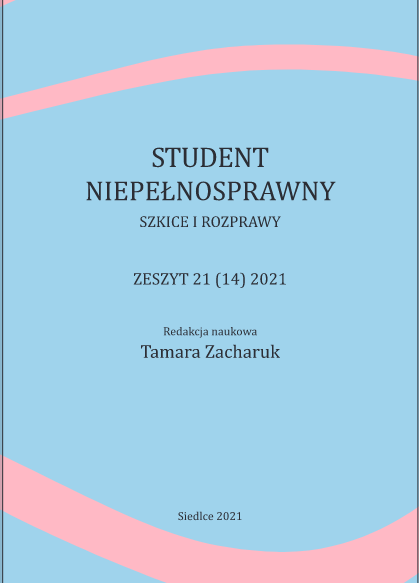MODEL MOCNYCH STRON A DZIAŁANIA POMOCOWE W UCZELNI
DOI:
https://doi.org/10.34739/sn.2021.21.09Słowa kluczowe:
model strengths, students with disabilities, inclusive, universityAbstrakt
The study focuses on the characteristics of strengths-based model in the form of psychological and social resources of the disabled student. The analysis takes into consideration the effects of interpersonal relations in the academic context, as well as the outcomes of the disabled student support system implemented at Siedlce University. The study is based on the assumption that assistance and support elements of the programme are pivotal for the disabled student’s sense of support of the disabled student. According to the premises of positive psychology, the characteristics that constitute the strengths of an individual were singled out. The respondents, who were Siedlce University students, were asked to assess the increase of their competences, the senseof development of potential, as well as the feeling of fulfilment and control over their own lives. The sum of these elements was treated as the total assessment of the psychological and social resources that students have at their disposal. To determine statistically significant differences between the assessment of particular features of the model in the perception of the disabled and able-bodied student, a linear regression analysis and a one-factor analysis of variance were carried out. It was found that students with disabilities obtained higher means with regard to the sense of increase in competence and the feeling of support than those without disabilities, where these differences were statistically significant. The able-bodied respondents significantly assessed the feeling of control over their own lives more than the disabled students. As far as the sense of development of their own potential and the feeling of fulfilment are concerned, the means for both respondent groups did not differ statistically significantly. The evaluation of the inclusion model, i.e. psychological and social resources, was identified to be at the same level in both groups. On the basis of the linear regression analysis, it could be stated that all features of the strengths-based model correlate strongly positively with the feeling of received support. The results of the present study point to the conclusion that the inclusive model integrating disabled students with their able peers, academic teachers, and administration personnel, which has been applied at Siedlce University (Poland) for over 50 years, brings certain positive effects not only for the disabled student but also for the one without any deficits.
Pobrania
Bibliografia
Books, London.
Gulla B., Tucholska K. (2007), Psychologia pozytywna: cele naukowo-badawcze
i aplikacyjne oraz sposób ich realizacji. Studia z psychologii w KUL, t. 14, Wyd.
KUL, Lublin, s. 133-152.
Pluskota A. (2015), Inkluzja czy iluzja? Praktyki całożyciowego uczenia się w modelach
interwencji społecznej, Wyd. Nauk. UMK w Toruniu, Toruń.
Seligman M.E.P, Csikszentmihalyi M. (2000), Positive psychology. An introduction,
„American Psychologist”, 55(1), s. 5-14.
Seligman M.E.P et al. (2009), Positive education: positive psychology and classroom
interventions, „Oxford Reviev of Education”, 35(3), s. 293-311.
Seligman M.E.P. (2011), Flourish: A Visionary New Understanding of Happiness
and Well-being, Free Press, New York.
Sobczak S., Gaik B. (2015), Edukacja inkluzyjna jako proces edukacyjno-
-wychowawczy realizowany w szkole w interpretacji pedagogiki ponowoczesnej,
[w:] L. Pytka, T. Zacharuk (red.), Èlan vital w edukacji inkluzyjnej i profilaktyce
kreatywnej, Wyd. Nauk. UPH w Siedlcach, Siedlce, s. 217-226.




